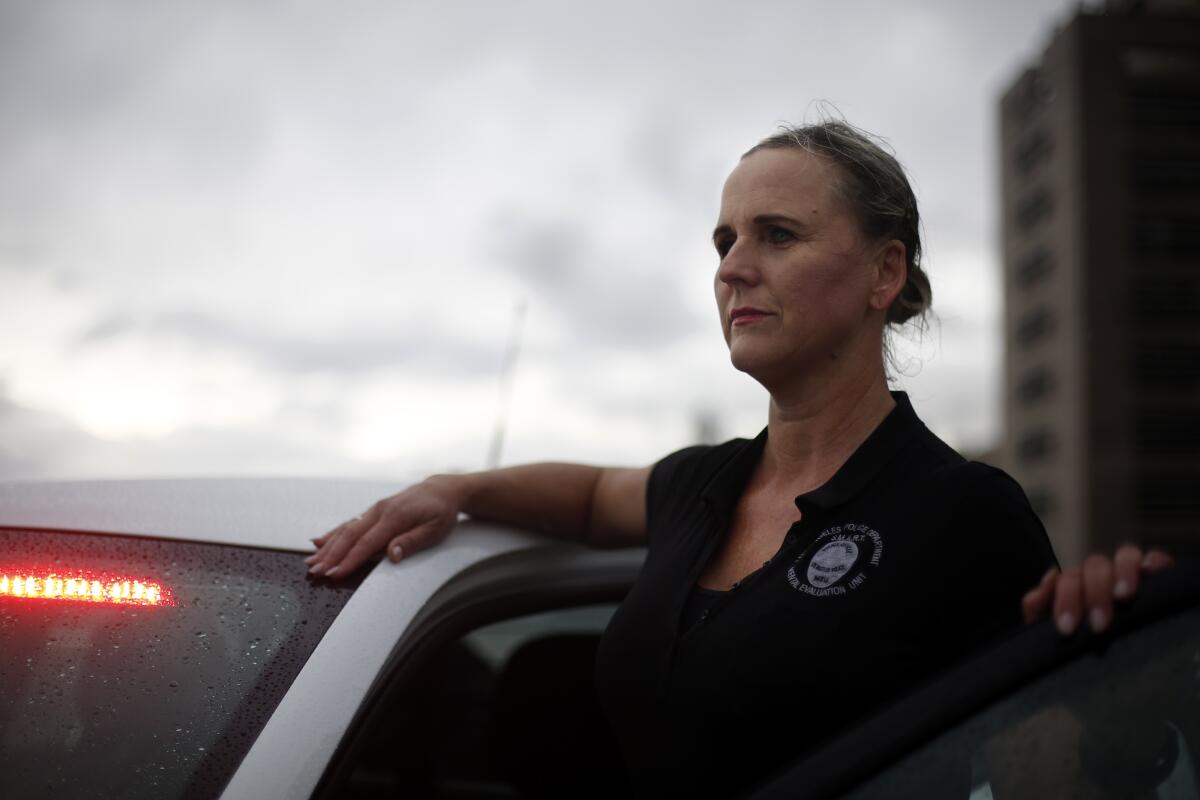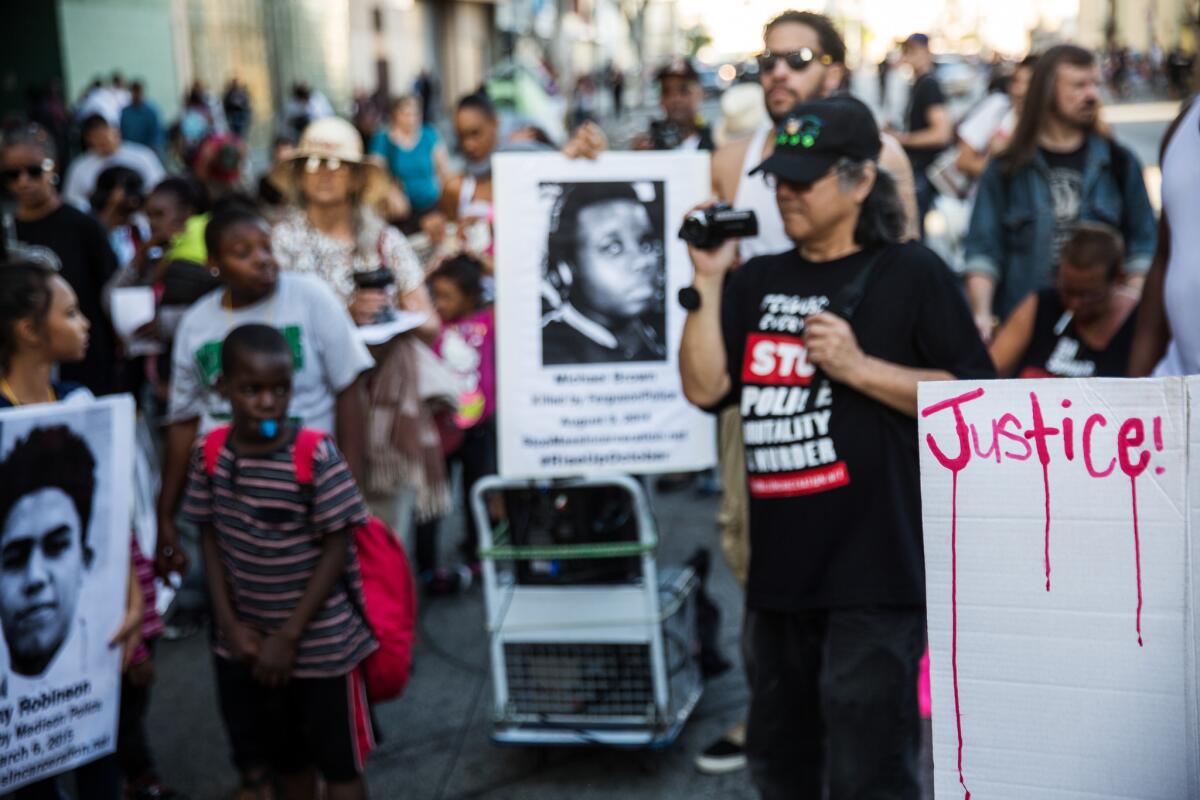Reformers want police to step back from mental health calls. The LAPD says it’s been trying

- Share via
The young woman was walking along the ledge of a parking structure downtown when Los Angeles police officer Stacy Pierce-Rogers arrived.
For more than an hour that night, Pierce-Rogers and the woman, who appeared to be in her 20s, talked about Taylor Swift, church, tarot cards and horoscopes. At one point, the woman wanted to pray, so the officer held her hand.
“I started praying with her, not really knowing what I was saying but just trying to make her feel better,” Pierce-Rogers said of the 2017 incident.
The episode ended with officers pulling the woman to safety. It was among thousands of mental health calls the LAPD responds to annually. Officers in 2018 were dispatched to more than 6,000 calls of actual and possible suicide attempts.
That may soon change. Protests over police brutality following the killing of George Floyd have spurred a movement to redirect law enforcement funding to community services and reduce police contact with the public in areas such as mental health calls and involvement with the homeless.
Los Angeles City Council members have introduced a motion to develop a new emergency response that uses trained specialists, rather than LAPD officers, to render aid to homeless people and those suffering from mental health and substance abuse issues.
The LAPD, in fact, had already been moving in this direction, with a plan to divert some 911 suicide calls to a phone line run by Didi Hirsch Mental Health Services, a county-contracted provider.
In light of calls to defund the police and re-imagine public safety, LAPD Chief Michel Moore has spoken of the burden of officers filling gaps in social services.
“We have taken on task after task after task,” he said during a virtual community forum. “I believe when you take those other tasks away from us and give them to people who can handle that work more effectively and efficiently, it will allow us as a police department to provide for public safety with our core functions.”
While officers sometimes manage high-risk situations, like coaxing a jumper off a ledge, often they simply talk and provide resources to someone going through a mental health crisis. Those types of calls may be better served without police intervention, said Lt. Brian Bixler, who runs the department’s crisis response support section.
“We get, by default, dispatched to things we have to care for because no one else is coming,” said Bixler. “Sometimes the mere presence of a police officer can increase [a person’s] agitation or increase their resolve. … A person on a suicide hotline can talk to an individual for hours and link them to resources, and that’s preferable.”
The intrusion of the COVID-19 pandemic has stymied efforts to move forward with the change quickly.
Miriam Brown, deputy director of the emergency outreach and triage division at the county’s Department of Mental Health, said a proposal for her agency to fund an initiative “was put on hold because of COVID-19.”
Bixler, though, said he’s searching for other financial support.
The calls to remove police from social welfare tasks come as police departments across the country report a growing number of mental health calls and search for better ways to respond. In 2019, the LAPD’s mental health triage desk received 20,758 calls.
“People are calling because the police are a 24-hour service,” said Chuck Wexler, executive director of the Police Executive Research Forum, a Washington think tank. “You get all these calls coming to the dispatch center, and the question is, who is the most appropriate agency to deal with it?”

Under current protocols, an LAPD patrol unit dispatched to a suicide call will stabilize the scene, handcuff the individual and, in some cases, determine if they meet the criteria for a 5150 hold, a detention of up to 72 hours for those deemed a threat to themselves or others, or for those gravely disabled due to a mental illness.
The LAPD’s 24-hour triage desk for mental evaluation pairs officers and county mental health specialists and will assess whether to dispatch a Systemwide Mental Assessment Response Team, or SMART.
Pierce-Rogers, a SMART officer and former emergency medical technician, tries to calm people by reiterating that they are not in trouble.
But it can be difficult to spare a person from the discomfort of being seen by neighbors in handcuffs or having police cars show up at their home. Officers may try to cover someone with a jacket or lead them out through a back route.
“I understand how they feel; I can see it in them,” said Pierce-Rogers. “They’re telling us we’re making it worse, but we have to follow our protocol and our policies. ... Sometimes they just want to talk, and they’re like, ‘I feel better now.’”
Under a new scheme, the dispatcher could hand off a call from a suicidal person or third party to Didi Hirsch counselors. A call wouldn’t be diverted if a person was threatening to jump off a structure or run into traffic, needed emergency medical attention, had a weapon in a public place or with people present or posed another public safety risk. Didi Hirsch could also transfer the call back to 911.
Such a system aims to minimize instances where people might avoid seeking help in the future because they were put in handcuffs or involuntarily hospitalized, said Sandri Kramer, the project and grants manager for Didi Hirsch’s Suicide Prevention Center.
“There’ll be sirens involved and flashing lights — it’s definitely not a quiet way to get somebody some help,” said Kramer. “You can imagine a person in high emotional distress — that’s the last thing they would need.”
In 2018, less than 3% of mental health calls, or about 550 incidents, involved use of force by LAPD officers. But several high-profile officer-involved shootings of people appearing to be in a mental health crisis have sparked outcries. In 2018, for example, a jury found two officers liable in the 2015 fatal shooting of Charly “Africa” Keunang, a 43-year-old homeless man. The incident set off days of protest and prompted fierce criticism of how police deal with mentally unstable people in downtown’s skid row.
Bixler hopes fewer encounters will decrease “suicide by cop” attempts, instances in which a person tries to provoke officers to use deadly force. LAPD officers reported responding to 105 such episodes in 2019 — down from 163 in 2015. They identified the incidents by the person’s actions or by verbal statements, such as an individual asking an officer to kill them.
“By us not even going,” said Bixler, “we are reducing the potential lethality of that event.”
It’s a grave concern for police departments. In a 2009 study of more than 700 officer-involved shootings nationwide, 36% of incidents were people attempting to provoke police force. But a 2019 study of Los Angeles police, co-authored by the LAPD and Cal State Fullerton, reported a low rate of fatalities stemming from these encounters. In 419 cases examined between 2010 and 2015, officers used lethal force in a small number of incidents, killing four people. About 80 percent of the cases didn’t involve force.
The Houston Police Department is among a number of cities that divert some 911 calls to mental health professionals. It might take two hours for patrol officers to respond to a mental health call, while the average phone conversation for diverted calls is about 12 minutes, said Lt. Patrick Plourde of the department’s mental health division.
Amid the protests over Floyd’s death, San Francisco Mayor London Breed announced that police officers will be replaced with trained, unarmed professionals to respond to calls for help on noncriminal matters, including mental health, the homeless and school discipline. That change and others are part of a plan by the mayor to try to reduce police confrontations with the community.
Brown, who oversees L.A. County’s mental health hotline, said a lack of resources has hindered efforts to connect the 911 system more directly to the hotline and embed clinicians with 911 dispatchers.
“It’s not an easy fix,” she said.
Randy Estrada, a SMART officer who worked as an emergency room technician before joining the LAPD, has responded to calls he believes would have been better suited for a hotline.
In February, he responded to a 911 call from someone in a relationship with a woman who was playing with a knife in her home. The caller knew that the woman had attempted suicide before and struggled with depression.
The woman was taken to a station by officers, where she sat handcuffed in an interview room and spoke with Estrada.
“She was bawling; she wasn’t really listening to us,” he said. “She wasn’t being forthright — she was minimizing the whole incident.”
After several hours, he determined there was no threat of suicide. But the encounter might have been avoided if the caller had been connected with a mental health professional, who may have helped to defuse the situation, Estrada said.
“It definitely would have calmed her nerves,” he said of the caller. “I think the person reporting didn’t know what to do with that situation.”
More to Read
Sign up for Essential California
The most important California stories and recommendations in your inbox every morning.
You may occasionally receive promotional content from the Los Angeles Times.














